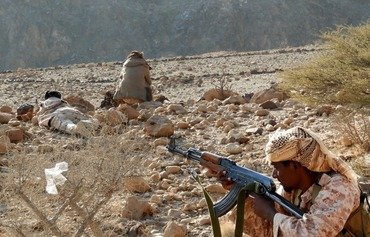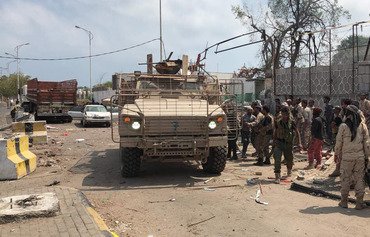Yemeni society has not embraced the local branch of the "Islamic State of Iraq and Syria" (ISIS), which has been forced underground and is struggling to recruit fighters and followers, experts told Al-Mashareq.
ISIS does not have tribal support because of the slaughter and killing it has perpetrated in recent years, they said, which is one of the main reasons for the current weakened state of the group's Yemen branch.
Security forces in Lahj province on November 6th arrested an ISIS leader without resistance from his family or area residents, said Jalal al-Rubaie, commander of the Security Belt forces in Lahj province.
The arrest was carried out following surveillance and tracking operations by intelligence operatives, who had received a tip-off that a wanted ISIS leader had returned to the area, he said.
In their efforts to track down ISIS elements, security forces have had significant co-operation from civilians, al-Rubaie said.
This help has even come from families reporting the sudden disappearance of their sons, who they suspect of having joined extremist groups, he added.
Lack of social, tribal support
The recent arrest makes it clear that ISIS does not enjoy social or tribal support in Yemen and is therefore forced to conduct its operations in a covert manner, political analyst Adnan al-Humairi told Al-Mashareq.
"Yemen is not an incubating environment for ISIS," he said.
"The heinous acts and bombings ISIS carried out in Sanaa, Yemen and the entire region that resulted in the slaughter and killing of innocent people left a bad image of the group," he added.
ISIS "raises the banner of Islam while Islam is innocent of it", al-Humairi added, stressing that Yemeni tribes will never host a group "whose project is slaughter".
Meanwhile, "there will be a strong challenge from al-Qaeda to ISIS’s project, as most of al-Qaeda’s leaders are tribesmen, which is the case in al-Bayda, Radaa and most regions in Yemen", he said.
"ISIS is currently operating a training camp in the Yakla area of al-Qayfa district [in al-Bayda province] and is at war with [both] al-Qaeda and the legitimate government," he said.
Fierce fighting broke out in al-Qayfa in mid-July between ISIS and al-Qaeda in the Arabian Peninsula (AQAP), in which 13 AQAP elements were killed and 12 others arrested by ISIS.
In response, AQAP attacked an ISIS position in the town, killing more than 25 ISIS elements and seizing weapons and military vehicles.
AQAP also called in a statement for continuing the fight against ISIS.
Experts told Al-Mashareq that the ongoing war between AQAP and ISIS is a natural product of the ideologies held by these extremist religious movements.
Each side seeks to impose its control over the entire territory in which it is present and to eliminate any "competitor that might want to share in the power", al-Humairi previously told Al-Mashareq.
Unable to recruit Yemeni youth
ISIS has been recruiting small numbers of youth by enticing them with money, al-Humairi said, exploiting the economic hardship many of them face, which has been exacerbated by the ongoing war.
"I think it will only be able to recruit a very small number of them," he said. "However, the continuation of the war will enable it to recruit the poor who have no means of making a living."
ISIS "has lost its lustre and ability to recruit the youth, especially after the divisions and blows that wracked the group in the Levant, Iraq and the Arab Maghreb", said Mohammed Azzan, a researcher specialising in extremist groups.
"It is natural that the group would retreat into a state of latency to rejuvenate itself with new blood and more [recruits with] closed minds and complex and turbulent psyches," he said.
ISIS's "extremist and irrational ideas can only see the light of day if they are imposed with tyrannical force", journalist Mounir Talal told Al-Mashareq.
ISIS’s shift to covert operations is a natural stage for extremist groups, he said, especially when it is at war with several political, religious or sectarian parties.

![A photo taken March 13th in the port city of Aden shows Yemenis inspecting the wreckage of a car in the aftermath of a suicide bombing claimed by ISIS, which hit UAE-trained Yemeni troops. [Saleh al-Obeidi/AFP]](/cnmi_am/images/2018/11/21/15385-Yemen-Aden-ISIS-600_384.jpg)







I want to go to ISIS
Reply1 Comment(s)